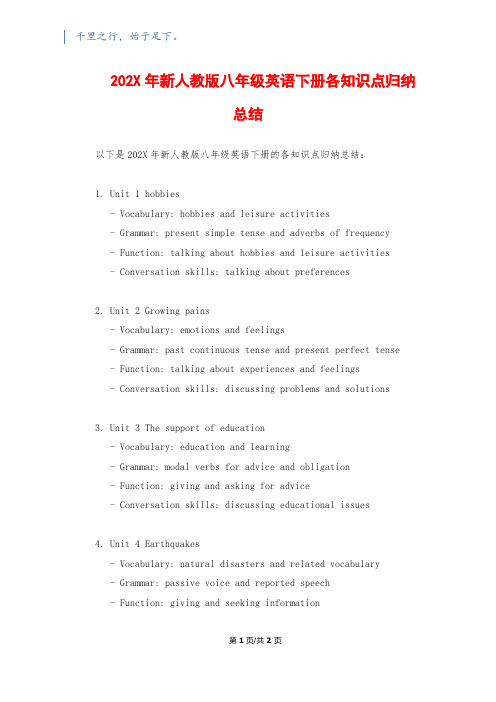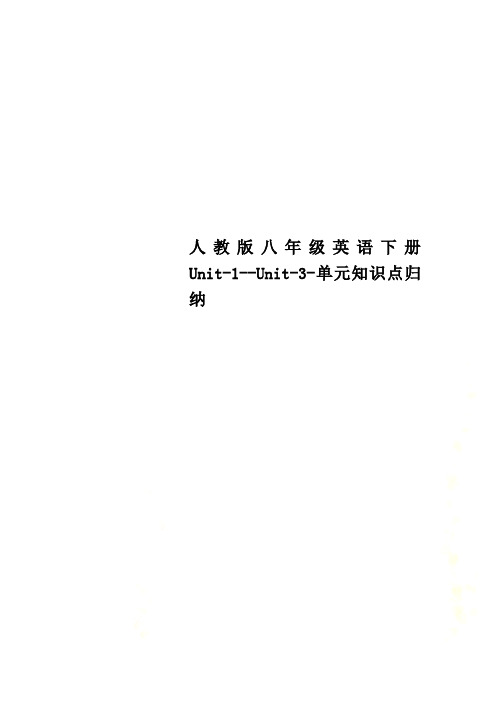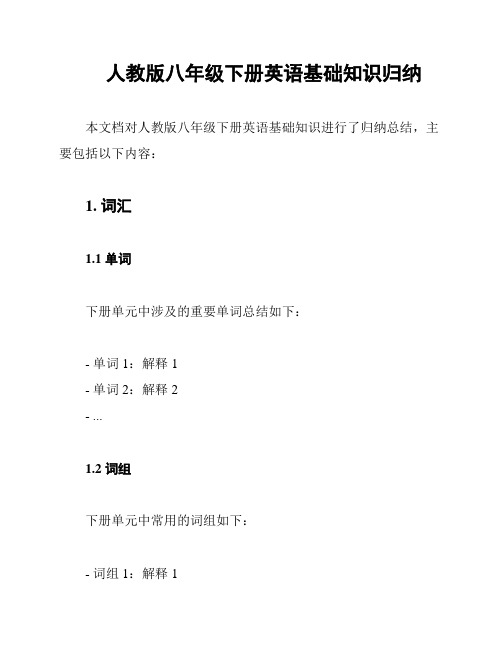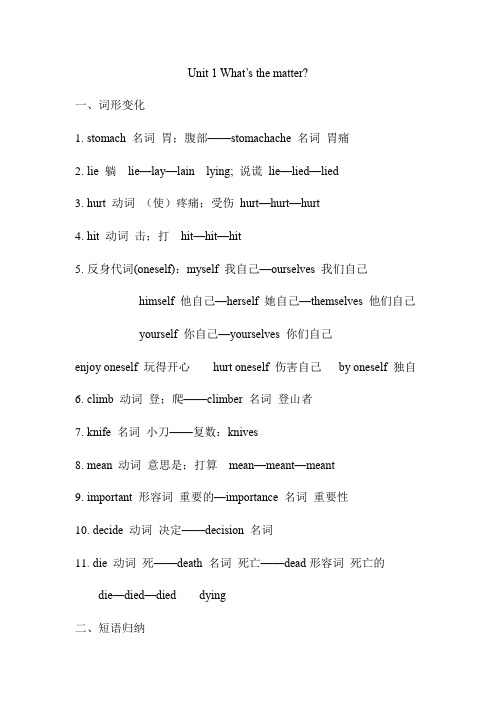人教版八年级英语下册各单元知识点汇总
202X年新人教版八年级英语下册各知识点归纳总结

千里之行,始于足下。
202X年新人教版八年级英语下册各知识点归纳总结以下是202X年新人教版八年级英语下册的各知识点归纳总结:1. Unit 1 hobbies- Vocabulary: hobbies and leisure activities- Grammar: present simple tense and adverbs of frequency- Function: talking about hobbies and leisure activities- Conversation skills: talking about preferences2. Unit 2 Growing pains- Vocabulary: emotions and feelings- Grammar: past continuous tense and present perfect tense - Function: talking about experiences and feelings- Conversation skills: discussing problems and solutions3. Unit 3 The support of education- Vocabulary: education and learning- Grammar: modal verbs for advice and obligation- Function: giving and asking for advice- Conversation skills: discussing educational issues4. Unit 4 Earthquakes- Vocabulary: natural disasters and related vocabulary- Grammar: passive voice and reported speech- Function: giving and seeking information第1页/共2页锲而不舍,金石可镂。
人教版八年级英语下册Unit-1--Unit-3-单元知识点归纳

人教版八年级英语下册Unit-1--Unit-3-单元知识点归纳free【动词】使……解脱,得到自由He could not free his arm.free from21. run out用完,用尽 When his water run out, he knew that he would have to do something to save his own life.物sth. tun out. 某物用尽了。
人sb. run out of物sth..人用尽了某物。
He run out of all his money last night.22.risk sth to do sth. 冒着...的风险去做某事 take a risk=take risks 冒险risk doing ...=take the risk of doing ...23. the importance of (doing) sth.(做)某事的重要性 We students should know the importance of (learning) English.importance n. 重要(性), important adj.重要的,unimportant adj.24.decision 【名词】决定;抉择; make a decision to do sth.decide25. be in the control of …掌管,管理 The headmaster is in the control of this new school. be out of control无法控制,无法管理 be under control被控制住,在控制之中26. 【复习】mind意为介意,Would you mind my opening the window?27. give up (doing) sth. 放弃(做)某事,give up (playing) computer games;give up后可接名词、代词和动词ing形式,也可不接,如 Never give up easily.II. 重点短语1. have a fever 发烧2. have a cough 咳嗽3. have a toothache 牙疼4. talk too much 说得太多5. drink enough water 喝足够的水6. have a cold 受凉;感冒7. have a stomachache 胃疼8. have a sore back 背疼9. have a sore throat 喉咙痛10. lie down and rest 躺下来休息11. hot tea w ith honey 加蜂蜜的热茶12. see a dentist 看牙医13. get an X-ray 拍X 光片14. take one’ s temperature量体温15. put some medicine on sth. 在……上面敷药16. feel very hot 感到很热17. sound like 听起来像18. all weekend 整个周末19. in the same way 以同样的方式20. go to a doctor 看医生21. go along 沿着……走22. on the side of the road 在马路边23. shout for help 大声呼救24. without thinking twice 没有多想25. get off 下车26. have a heart problem 有心脏病27. to one’ s surprise使....... 惊讶的28. thanks to 多亏了;由于29. in time 及时30. save a/one’s life挽救生命lose one's life 31. get into trouble 造成麻烦32. right away 立刻;马上33. because of 由于34. get out of 离开;从……出萍35. hurt oneself 受伤36. put a bandage on sth. 用绷带包扎37. fa ll down 摔倒38. feel sick 感到恶心39. have a nosebleed 流鼻血40. cut his knee 割伤他的膝盖41. put her head back 把她的头向后仰42. have problems breathing 呼吸困难43. mountain climbing 登山运动44. be used to doing sth. 习惯做某事45. run out (of) 用完;用尽46. so that 以便47. so. . . that 如此… …以至于…48. be in control of 掌管;管理49. in a difficult situation 在闲境屮50. keep on doing sth. 继续或坚持做某事51. make a decision 做出决定52. take risks 冒险53. give up 放弃III. 重点语法【反身代词】英语中共有八个反身代词,在使用时应注意和它所指的相应的对象在人称、性别、数上保持一致。
八年级下册人教版英语笔记

八年级下册人教版英语笔记一、Unit 1 What's the matter?1. 重点单词。
- matter:n. 问题;事情。
常用搭配:What's the matter (with sb.)? = What's wrong (with sb.)? = What's the trouble (with sb.)?(某人)怎么了?- sore:adj. 疼痛的;酸痛的。
例如:a sore throat喉咙痛。
- stomachache:n. 胃痛;腹痛。
- foot:n. 脚;足。
复数形式是feet。
- neck:n. 脖子;颈部。
- fever:n. 发烧。
have a fever发烧。
- lie:v. (lay - lain)躺;平躺。
lie down躺下。
- rest:v. & n. 放松;休息。
take breaks/take a break = have a rest休息。
- cough:v. & n. 咳嗽。
have a cough咳嗽。
- toothache:n. 牙痛。
2. 重点短语。
- have a cold:感冒。
- have a stomachache:胃痛。
- lie down and rest:躺下休息。
- drink some hot tea with honey:喝些加蜂蜜的热茶。
- see a dentist:看牙医。
- get an X - ray:拍X光片。
- take one's temperature:量体温。
3. 重点句型。
- What should I do? 我应该做什么?- You should see a dentist and get an X - ray. 你应该去看牙医并拍X光片。
- Should I put some medicine on it? 我应该在上面敷些药吗?- Yes, you should. / No, you shouldn't. 是的,你应该。
人教版八年级下册英语基础知识归纳

人教版八年级下册英语基础知识归纳
本文档对人教版八年级下册英语基础知识进行了归纳总结,主要包括以下内容:
1. 词汇
1.1 单词
下册单元中涉及的重要单词总结如下:
- 单词1:解释1
- 单词2:解释2
- ...
1.2 词组
下册单元中常用的词组如下:
- 词组1:解释1
- 词组2:解释2
- ...
2. 语法
本章节总结了下册单元中的重要语法知识点:2.1 时态
在下册中,常用的时态包括:
- 一般现在时:用于表示经常性动作、客观真理等- 进行时:用于表示正在进行的动作
- ...
2.2 句型
下面是下册单元中出现的常用句型:
- 句型1:解释1
- 句型2:解释2
- ...
3. 阅读理解
本章节总结了下册的阅读理解题类型和解题方法:3.1 完形填空
- 类型1:解题方法1
- 类型2:解题方法2
- ...
3.2 阅读理解
- 类型1:解题方法1
- 类型2:解题方法2
- ...
4. 写作技巧
本章节总结了下册单元中的写作技巧和注意事项:
- 写作技巧1:解释1
- 写作技巧2:解释2
- ...
以上是人教版八年级下册英语基础知识的归纳总结。
希望本文档能对您的学习有所帮助!。
人教版八年级英语下册各知识点归纳总结

人教版八年级英语下册各知识点归纳总结Knowledge Summary of People's Education Edition Eighth Grade English TextbookUnit 1 Dream JobsIn this unit, students learn about different occupations and career paths. They practice talking about their dream jobs and discussing the pros and cons of different professions. Vocabulary includes words related to jobs, such as lawyer, engineer, chef, etc. Grammar points include the present simple tense for expressing routines and habits, as well as future forms for talking about future plans.Unit 2 Healthy EatingThis unit focuses on the importance of a balanced diet and healthy eating habits. Students learn about different food groups, nutrients, and the benefits of eating a variety of foods. Vocabulary includes words related to food, such as carbohydrates, proteins, vitamins, etc. Grammar points include using countable and uncountable nouns, as well as quantifiers such as some, any, much, and many.Unit 3 Travel PlansIn this unit, students learn how to talk about their travel plans and experiences. They practice using travel vocabulary and expressions, as well as giving recommendations for places to visit. Vocabulary includes words related to travel, such as destination, itinerary, accommodation, etc. Grammar points include present perfect tense for talking about past experiences and future forms for making predictions and plans.Unit 4 Environmental ProtectionThis unit focuses on the importance of protecting the environment and taking action to preserve natural resources. Students learn about environmental issues and discuss ways to reduce waste and pollution. Vocabulary includes words related to the environment, such as recycling, renewable energy, pollution, etc. Grammar points include modals of obligation and necessity for giving advice and making suggestions.Unit 5 Festivals around the WorldIn this unit, students learn about different festivals and celebrations from around the world. They practice talking about cultural traditions, customs, and rituals. Vocabulary includes words related to festivals, such as celebrations, traditions, customs, etc. Grammar points include using the present perfecttense to talk about past experiences and cultural differences in expressing gratitude and apologies.Overall, the eighth grade English textbook covers a wide range of topics and language skills, including vocabulary, grammar, speaking, listening, reading, and writing. Students are exposed to a variety of real-life situations and authentic materials to help them develop their language proficiency and communication skills. By the end of the school year, students should feel more confident and competent in using English in different contexts and situations.。
(完整版)最新人教版八年级下册英语全册知识点大全

最新人教版八年级下册英语全册知识点大全Unit 1重点短语:have a stomachache have a cold lie downtake one’s temperature have a fever go to a doctorto one’s surprise agree to (do sth.)get into troublebe used to take risks run out (of)cut off get out of be in control ofkeep on ( doing sth.)give up语言知识归纳:1. What’s the matter (w ith you)?此句用来询问别人的病情。
类似的句子还有:What’s wrong with you?/ What’s the trouble?matter作动词用,意为“要紧”“有关系”,主要用于疑问句和否定句。
What does it matter? It doesn’t matter.【例题】Does it ________ if we can’t finish it today?A. mindB. mindsC. matterD. matters2. I have a sore throat.have “患病”,常用“have a /an+ 名词”.have a cold have a fever have a sore backhave a stomachache have a cough【例题】( )---Does he often have ______ cold? ---Yes. He also _____a cough and a sore throat.A. a; hasB. /; hasC. a; haveD. /; have3.Lie down and rest! 躺下休息lie down 躺下4.That’s probably why. 那可能就是原因。
最全面人教版八年级下册英语各单元知识点总复习归纳总结

最全面人教版八年级下册英语各单元知识点总复习归纳总结Unit 1 How often do you exercise?词汇1. frequently 经常地2. hardly 几乎不3. ever 曾经4. once in a while 时不时5. rarely 很少语法一般现在时1. 频率副词放在动词前:I always read newspapers.2. 否定句用don't或doesn't+动词原形:I don't watch TV every day.3. 疑问句用do或does+主语+动词原形:Do you play soccer every week?Unit 2 I used to be afraid of the dark.词汇1. used to 过去常常2. get over 克服3. nervous 紧张的4. confident 有信心的5. stage 舞台语法1. Be used to+动名词表示惯或适应,I am used to studying English at night.2. Used to+动词原形表示过去常常,I used to read books every day.3. Get over+名词/代词/动名词,表示克服,She got over the flu last week.Unit 3 Could you please tell me where the restaurants are?词汇1. instruction 说明2. turn right/left 向右/左转3. excuse me 对不起4. straight 直走5. opposite 对面语法1. Could you please/could/may I+动词原形,请求礼貌地做事,Could you please help me with my English?2. Would like+名词 / 动名词,表示想要做某事,I would like to go shopping with you.3. May I ask+句子,礼貌地询问某事,May I ask where the restroom is?Unit 4 Why don't you talk to your parents?词汇1. conversation 对话2. listener 听众3. honest 诚实的4. conversation starter 聊天开场白5. effective 有效的语法1. How about/What about+动名词/名词,表示建议和提议,What about watching a movie?2. Why not+动词原形,表示建议和提议,Why not go swimming?3. Let's+动词原形,表示建议和提议,Let's have a party on the weekend.Unit 5 It must belong to Carla.词汇1. sweater 毛衣2. by accident 偶然地3. honest 诚实的4. lose 丢失5. owner 拥有者语法1. Can/Can't+动词原形,表示能力或可能性,I can dance.2. Must/Mustn't+动词原形,表示肯定或否定的推断,She must be the new teacher.3. Have/Has to+动词原形,表示必须做的事情,I have to finish my homework first.词汇1. graduate 毕业生2. physics 物理学3. ambitious 有抱负的4. career 职业5. education 教育语法一般将来时1. be going to+动词原形,表示打算做某事,I am going to see a film tonight.3. be + going to+现在进行时,表示不久会发生的事情,They are going to sing a song later.Unit 7 How do you make a banana milk shake?词汇1. recipe 食谱2. whip 打(奶油)3. peel 去皮4. slice 切片5. pour 倒语法1. What/How/Which+系动词+主语+谓语,表示特定的主语或具体的内容。
期末Units1-10单元知识点总结 人教版八年级英语下册

Unit 1 What’s the matter?一、词形变化1.stomach 名词胃;腹部——stomachache 名词胃痛2.lie 躺lie—lay—lain lying; 说谎lie—lied—lied3.hurt 动词(使)疼痛;受伤hurt—hurt—hurt4.hit 动词击;打hit—hit—hit5.反身代词(oneself):myself 我自己—ourselves 我们自己himself 他自己—herself 她自己—themselves 他们自己yourself 你自己—yourselves 你们自己enjoy oneself 玩得开心hurt oneself 伤害自己by oneself 独自6.climb 动词登;爬——climber 名词登山者7.knife 名词小刀——复数:knives8.mean 动词意思是;打算mean—meant—meant9.important 形容词重要的—importance 名词重要性10.decide 动词决定——decision 名词11.die 动词死——death 名词死亡——dead形容词死亡的die—died—died dying二、短语归纳1.lie down 躺下to one’s (my/his/her...) surprise 令某人惊讶的是2.take one’s (my/your/his/her..) temperature 量体温3.take a break = take breaks 休息take a risk = take risks冒险4.run out 物做主语:The money ran out. 钱用光了。
run out of 人做主语:I ran out of money. 我用光了钱。
5.make a decision = make decisions 做决定6.be in control of 掌管He is in control of the company. 他掌管公司。
- 1、下载文档前请自行甄别文档内容的完整性,平台不提供额外的编辑、内容补充、找答案等附加服务。
- 2、"仅部分预览"的文档,不可在线预览部分如存在完整性等问题,可反馈申请退款(可完整预览的文档不适用该条件!)。
- 3、如文档侵犯您的权益,请联系客服反馈,我们会尽快为您处理(人工客服工作时间:9:00-18:30)。
18. hit (用手或器具)打;击打 The boy hit the dog with a stone.
hit sb. on the head/ nose/ back
打某人的头、鼻子、后背, on 用在所打较
硬的部位;
hit sb. in the face/ eye/ stomach
打某人的脸、眼睛、肚子, in 用在所打
sound like+ 名词代词和从句: It sounds like you don ’t know the truth.
It sounds like a good idea. sound+ 形容词,“听起来,好像”,The music sounds
nice.
9. need 需要,实义动词 need+名词,需要某物;
16. hurt 及物动词,使……疼痛,……受伤, He hurt his leg while exercising.
不及物动词,……(部位)疼。 His leg hurt badly.
clean 【动词】打扫, clean the classroom 打扫教室,【形容词】 干净的 ,
cleaner 意为 清洁工 。
need to do sth. 需要做某事,主语通常是人,表示人主动的动作: You need to listen
carefully during class.
need doing sth. 主语通常是物,表示被动的动作:
Your dirty clothes need
washing.
10. get off (the bus)
较软的部位。
be used to sth./ doing sth. 习惯于、适应了……、做某事,强调状态; His grandpa
was used to country life.
Mary is not used to getting up early in the morning.
get/ become used to sth./ doing sth.
’s your trouble? = What
’s up?
= What happens to sb.?
— What’s the matter with you ?
— I have a bad cold.
2. I had a cold. 我感冒了。 have a cold=catch a cold=have the flu
“变得习惯,逐渐适应……”强调过程、
动作:
It ’s difficult for one to get used to another country
’s habit.
20. 【复习】 free [ 形容词 ] 空闲的 free time ;免费的 the drink is for free
;自
由的 I want to become a free bird.
就某事给某人建议; advise [ 动词 ]
advise
sb. to do sth. 建
议某人做某事
advise sb. doing sth.
【复习】 exercise 练习、锻炼
当 exercise 意为“练习”时,为可数名词 即可加 s
当 exercise 意为“锻炼”时,为不可数名词 即不加 s
感冒
have a fever 发烧 have a cough 咳嗽 have a stomachache 胃疼,肚子疼 have a
toothache 牙疼 have a headache 头疼
3. 身体部位 +ache(疼痛)构成新的复合词
stomach+ache=stomachache
head+ache=headache
八年级英语下册各单元知识点汇总
Unit 1 What ’s the matter?
一、基础知识
1. What ’ s the matter? 怎么啦?出什么事情了?
【解析】 matter/ ' m?t ?(r)) /n. 问题;事情
What’ s the matter with you?= What ’s the trouble with you? = What
6. lie down 躺下, lie 躺,躺着,过去式 lay ;lie 说谎,过去式 lied
7. maybe “或许”,常用于句首,表示可能性,后加句子。 Maybe you are right.
maybe,是情态动词 +be 的结构,意为“可能,也许”,后加名词、代词或形容词。 He
may be angry.
’s
wrong with you? 你怎么了?
【注】: matter 和 trouble 为名词, 其前可加 the 或形容词性物主代词, wrong 是
adj. 不能加 the
【用法】用于询问某人有什么病或某人遇到什么麻烦、 问题其后跟询问对象时,
与
介词 with 连用。即:
What’s the matter with sb.? = What
tooth+ache=toothache
back+ache=backache 后背痛
4. muchtoo+ 形容词,意为 太......
,too much+名词,意为 很多,大量 。
5. enough 【形容、副词】足够的 / 地, enough 放在名前后,形副后。 good enough 足
பைடு நூலகம்
够好, enough money=much money
下(公交车) get on 上车
11. agree 同意,赞同;
agree with sth. 同意某事
如: I agree with that idea.
agree to sb. 同意某人的意见 如: I agree to LiLei.
12. trouble 问题,麻烦 ;be in trouble 遇到麻烦, maketrouble 制造麻烦 ,have
trouble (in) doing sth. =have difficulties (in) doing sth
做...... 有麻烦。
13. right away=right now=at once ,意为 马上 。
14. advice [ 不可数名词 ] 劝告,建议,向…征求意见, give sb. advice on sth.
